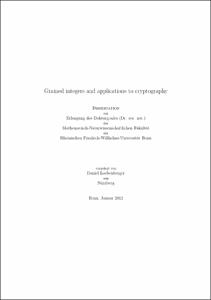Grained integers and applications to cryptography

Grained integers and applications to cryptography

| dc.contributor.advisor | von zur Gathen, Joachim | |
| dc.contributor.author | Loebenberger, Daniel | |
| dc.date.accessioned | 2020-04-17T22:02:48Z | |
| dc.date.available | 2020-04-17T22:02:48Z | |
| dc.date.issued | 24.05.2012 | |
| dc.identifier.uri | https://hdl.handle.net/20.500.11811/5311 | |
| dc.description.abstract | To meet the requirements of the modern communication society, cryptographic techniques are of central importance. In modern cryptography, we try to build cryptographic primitives, whose security can be reduced to solving a particular number theoretic problem for which no fast algorithmic method is known by now. Thus, any advance in the understanding of the nature of such problems indirectly gives insight in the analysis of some of the most practical cryptographic techniques. In this work we analyze exactly this aspect much more deeply: How can we use some of the purely theoretical results in number theory to answer very practical questions on the security of widely used cryptographic algorithms and how can we use such results in concrete implementations? While trying to answer these kinds of security-related questions, we always think two-fold: From a cryptographic, security-ensuring perspective and from a cryptanalytic one. After we outlined -- with a special focus on the historical development of these results -- the necessary analytic and algorithmic foundations of number theory, we first delve into the question how point addition on certain elliptic curves can be done efficiently. The resulting formulas have their application in the cryptanalysis of crypto systems that are insecure if factoring integers can be done efficiently. The rest of the thesis is devoted to the study of integers, all of whose prime factors are neither too small nor too large. We show with the help of two applications how one can use the properties of such kinds of integers to answer very practical questions in the design and the analysis of cryptographic primitives: The optimization of a hardware-realization of the cofactorization step of the General Number Field Sieve and the analysis of different standardized key-generation algorithms. | |
| dc.language.iso | eng | |
| dc.rights | In Copyright | |
| dc.rights.uri | http://rightsstatements.org/vocab/InC/1.0/ | |
| dc.subject | Allgemeines Zahlkörpersieb | |
| dc.subject | Elliptische Kurve | |
| dc.subject | Edwards-Form | |
| dc.subject | körnige Zahl | |
| dc.subject | RSA | |
| dc.subject | Standard | |
| dc.subject | Schlüsselerzeugung | |
| dc.subject | general number field sieve | |
| dc.subject | elliptic curve | |
| dc.subject | grained integer | |
| dc.subject | key generation | |
| dc.subject.ddc | 004 Informatik | |
| dc.title | Grained integers and applications to cryptography | |
| dc.type | Dissertation oder Habilitation | |
| dc.publisher.name | Universitäts- und Landesbibliothek Bonn | |
| dc.publisher.location | Bonn | |
| dc.rights.accessRights | openAccess | |
| dc.identifier.urn | https://nbn-resolving.org/urn:nbn:de:hbz:5n-28487 | |
| ulbbn.pubtype | Erstveröffentlichung | |
| ulbbnediss.affiliation.name | Rheinische Friedrich-Wilhelms-Universität Bonn | |
| ulbbnediss.affiliation.location | Bonn | |
| ulbbnediss.thesis.level | Dissertation | |
| ulbbnediss.dissID | 2848 | |
| ulbbnediss.date.accepted | 16.05.2012 | |
| ulbbnediss.fakultaet | Mathematisch-Naturwissenschaftliche Fakultät | |
| dc.contributor.coReferee | Stein, Andreas |
Files in this item
This item appears in the following Collection(s)
-
E-Dissertationen (4080)




